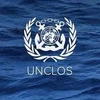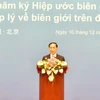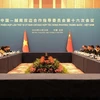Deputy Foreign Minister Pham Quang Vinh led a Vietnamese delegation to the sixth ASEAN-China Senior Officials’ Meeting in Suzhou city, Jiangsu province on September 14-15.
At the same time, the ninth meeting of the ASEAN-China working group on the implementation of the Declaration on the Conduct of Parties in the East Sea (DOC) took place in the same city.
At the meetings, ASEAN and China consulted each other on the building of a first Code of Conduct of Parties in the East Sea (COC) at senior official level (SOM) following consensus reached by foreign ministers of both sides in Brunei on June 30.
Addressing the event, Deputy FM Pham Quang Vinh shared his views on the recent progress in DOC performance. He stressed the importance of full and effective implementation of the principles and regulations stipulated in the DOC, first agreed in 2002, and called for the organisation to take more trust-building activities between nations within the framework of the DOC.
He also voiced his support to ASEAN’s common viewpoint on the need to finalise a binding COC which stipulates the rules and behaviours of the concerned parties to ensure peace, maritime security and safety, prevent and manage disputes and resolve disagreements through peaceful means on the basis of international law and the 1982 UN Convention on the Law of the Sea.
According to the Deputy Minister, this would contribute to enhancing the ASEAN-China strategic partnership while ensuring peace, stability and common development in the East Sea and the region.
The meetings agreed to further strengthen consultation between the two sides and ratified a working plan for DOC implementation in the 2013-2014 period. The plan includes a tentative agenda for SOM and joint working group meetings and proposes further cooperation within the DOC framework, such as setting up hotlines, organising seminars on search and rescue operations at sea and together protecting the ecosystem in the East Sea.
Regarding the COC, representatives from ASEAN and China welcomed their first official consultation on the code. They once again stressed the significance of ensuring peace, stability, security and maritime safety and freedom in the East Sea. They agreed that the building of a COC would be increasingly conducive to these aims in the context when the situation in the East Sea remains complicated. Building trust and an environment for the peaceful resolution of disputes at sea should be enhanced.
In that spirit, the two sides reached consensus on the next steps for the building of a COC.
Participants held that the COC should be built on the basis of the principles outlined between ASEAN and China in the past, especially the DOC signed in 2002, the Joint Statement of the ASEAN-China Summit on the 10 th anniversary of DOC and conclusions of the ASEAN-China Ministerial Meetings in June and August, 2013.
They agreed that the first ASEAN-China official consultation at SOM level was a positive and significant start.
However, more issues need to be discussed and settled. As a result, both ASEAN and China need to continue to implement the DOC together in parallel to ongoing discussions regarding the COC, according to participants.-VNA
At the same time, the ninth meeting of the ASEAN-China working group on the implementation of the Declaration on the Conduct of Parties in the East Sea (DOC) took place in the same city.
At the meetings, ASEAN and China consulted each other on the building of a first Code of Conduct of Parties in the East Sea (COC) at senior official level (SOM) following consensus reached by foreign ministers of both sides in Brunei on June 30.
Addressing the event, Deputy FM Pham Quang Vinh shared his views on the recent progress in DOC performance. He stressed the importance of full and effective implementation of the principles and regulations stipulated in the DOC, first agreed in 2002, and called for the organisation to take more trust-building activities between nations within the framework of the DOC.
He also voiced his support to ASEAN’s common viewpoint on the need to finalise a binding COC which stipulates the rules and behaviours of the concerned parties to ensure peace, maritime security and safety, prevent and manage disputes and resolve disagreements through peaceful means on the basis of international law and the 1982 UN Convention on the Law of the Sea.
According to the Deputy Minister, this would contribute to enhancing the ASEAN-China strategic partnership while ensuring peace, stability and common development in the East Sea and the region.
The meetings agreed to further strengthen consultation between the two sides and ratified a working plan for DOC implementation in the 2013-2014 period. The plan includes a tentative agenda for SOM and joint working group meetings and proposes further cooperation within the DOC framework, such as setting up hotlines, organising seminars on search and rescue operations at sea and together protecting the ecosystem in the East Sea.
Regarding the COC, representatives from ASEAN and China welcomed their first official consultation on the code. They once again stressed the significance of ensuring peace, stability, security and maritime safety and freedom in the East Sea. They agreed that the building of a COC would be increasingly conducive to these aims in the context when the situation in the East Sea remains complicated. Building trust and an environment for the peaceful resolution of disputes at sea should be enhanced.
In that spirit, the two sides reached consensus on the next steps for the building of a COC.
Participants held that the COC should be built on the basis of the principles outlined between ASEAN and China in the past, especially the DOC signed in 2002, the Joint Statement of the ASEAN-China Summit on the 10 th anniversary of DOC and conclusions of the ASEAN-China Ministerial Meetings in June and August, 2013.
They agreed that the first ASEAN-China official consultation at SOM level was a positive and significant start.
However, more issues need to be discussed and settled. As a result, both ASEAN and China need to continue to implement the DOC together in parallel to ongoing discussions regarding the COC, according to participants.-VNA



















